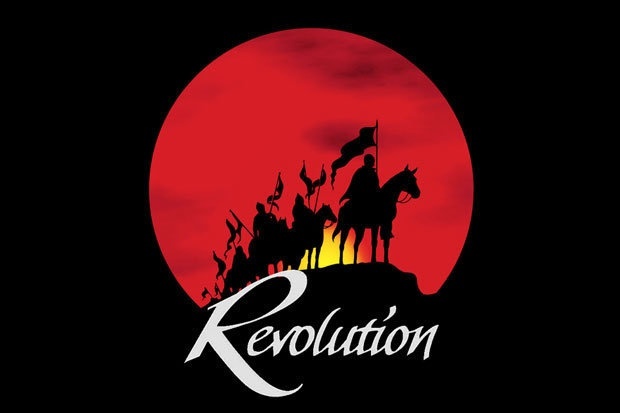
Cubed3.com: I grew up with adventure games in the late '80s/early '90s. What was your first experience with the genre and what made you passionate about making adventure games yourself?
Charles Cecil: It would have been around 1980 and I was sponsored by the Ford Motor Company as a management trainee. I'd just left school, and a friend who was also on the same course as me had just started a company. He disassembled the ROM of the ZX80, and he published it - he's a very smart guy. He was based in Hull and he invited me up to just see what he did. He - Richard Turner - and a friend of his - Chris Thornton - were writing these games and they showed me an adventure on the TRS80 - I don't remember which one it was but it would have been a Scott Adams adventure - and we had a play and it looked absolutely brilliant and he said "Could you do this?" and I said "Yes, of course I could." I had absolutely no idea how! And so I started writing adventure games for the Sinclair ZX81 back in 1981, and I slightly cringe at them now; they were very basic but they were popular and they sold quite well and the wonderful thing is a lot of people remember them because a lot of people played those ZX81 games back in those days so I feel very privileged to have been able to start writing adventure games pretty much right at the beginning - certainly from a European perspective. The company Richard had founded, Arctic Computing, might well be the first European games software company, as far as I know. I'm not sure if there are any that pre-date it, so I was just very lucky to be invited to be involved right at the beginning.
C3: So after a difficult spell in the early 2000s, there's been a bit of a resurgence in the popularity of point and click adventure games. Why do you think this is?
CC: Well, point and clicks of course had their heyday in the early '90s. We wrote Broken Sword in 1996 and even at that time Virgin was worried that the genre was declining and it was, but it was declining because retailers decided they weren't enormously keen on the genre. Because of that, publishers decided they didn't want to support it, but the death blow came with PlayStation. Publishers were absolutely obsessed with the fact that PlayStation, which was so successful, was all about visceral 3D games to the extent that when we wanted to write the first Broken Sword for the PlayStation, Virgin made it quite clear that it wasn't interested at all in publishing the game and so I approached Sony and frankly Sony wasn't all that enthusiastic either… but it agreed that it would publish it, and it was a huge hit - it sold half a million copies, which at the time was absolutely extraordinary. We went back with Broken Sword II to Virgin and again it said that it didn't want to publish it, so we worked directly with Sony again, which was great, and I think it sold even more, so it was quite clear that there was a real disconnect between what publishers and retailers thought and the truth of what gamers actually wanted to play.
As costs spiralled, so publishers became more risk averse, and as PlayStation marched on and console marched on and became ever more powerful, that marginalised PC, and there became less and less opportunity for adventures to appear at retail and, of course, in those days without retail you couldn't sell anything. So without a doubt the resurgence has come about with digital distribution, adventures are a niche of course, they are a very significant niche but they are a niche, and the publishers and retailers were avoiding niches they were trying to ensure that everything they did was in the mainstream. So it's very pure of course, the ability to distribute digitally. It offers people the opportunity to then support what they like. Financially, it democratises the ability to determine what games are produced by developers and there's a very significant market. We were thrilled of course with Broken Sword 5 because we went and launched a Kickstarter campaign and we now have this wonderful community of 15,000 people who evangelise for us, they are huge advocates. We feel hugely privileged to be able to communicate with such a positive and supportive, significant group of people.
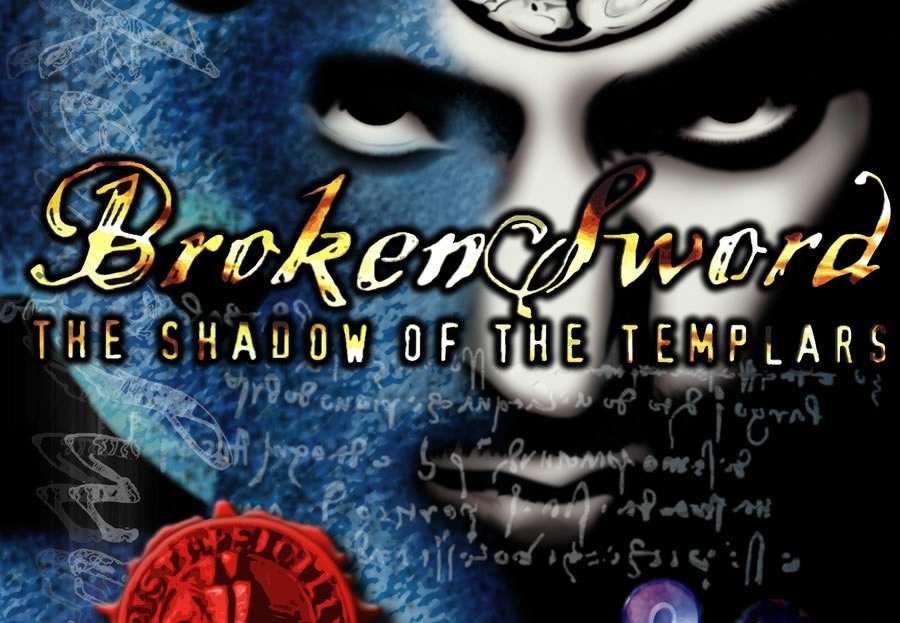
C3: You just mentioned your Kickstarter campaign. Do you think self-publishing or crowdfunding is now the only way to make adventure games or are publishers now a bit more open to the idea?
CC: During the retail times, if the game sold for say £20 and the retailer took roughly half of that, and the publisher would receive £10, take off the cost of goods, which would be about £2, and then pay the developer 20% of what was left so that's roughly 8% and against that 8% they would then deduct the development costs, and often some QA, and often some localisation and just about anything else. So it made absolutely no sense for developers at all, and when we go through digital channels we get 70%, so we get almost 10 times [more]. It is really under those circumstances that point and click adventures make sense. If a publisher funds they are going to take the lion's share of the profit, and under those circumstances it is very difficult to justify a point and click adventure. If you have crowdfunding, of course, then everything turns on its head and, while we certainly didn't expect the full development cost to be covered by crowdfunding, it gave us the funds we needed at a very early stage - and also at the most risky stage! - and from a financial perspective we could then leverage money later when the risk was lower. So we borrowed from the bank, we borrowed from the funding circle.
We also split the game into two halves, not from a financial perspective, but by doing so the revenues from part one helped to fund part two. So you do need to scrabble around to fund an adventure game because it's an expensive genre and in many ways we look at other genres that have a repetitive gameplay mechanic that drives the whole thing and in many ways wish we'd be writing games like that because they would be so much cheaper, and frankly so much easier to write, but then adventures are wonderful and we have a very specific audience but it is much more challenging to fund an adventure game than it would be in other genres certainly.
C3: Obviously you were very successful with the campaign for Serpent's Curse, so would you use Kickstarter again and, if so, what lessons did you take away from that specific campaign?
CC: Well, I'm quite proud of our Kickstarter campaign. We delivered a game that people were very pleased with. We delivered (admittedly some of them were quite late) everything we promised we would. We were honest, we told people as much as it was feasible to do under circumstances because obviously we didn't want to spoil. The one thing about dealing with a large community is what you mustn't do is change your mind. So, we only announced things when we were absolutely clear we would go down that route. So sometimes we had to hold things back but broadly I feel that we were pretty honest and people really appreciated that.
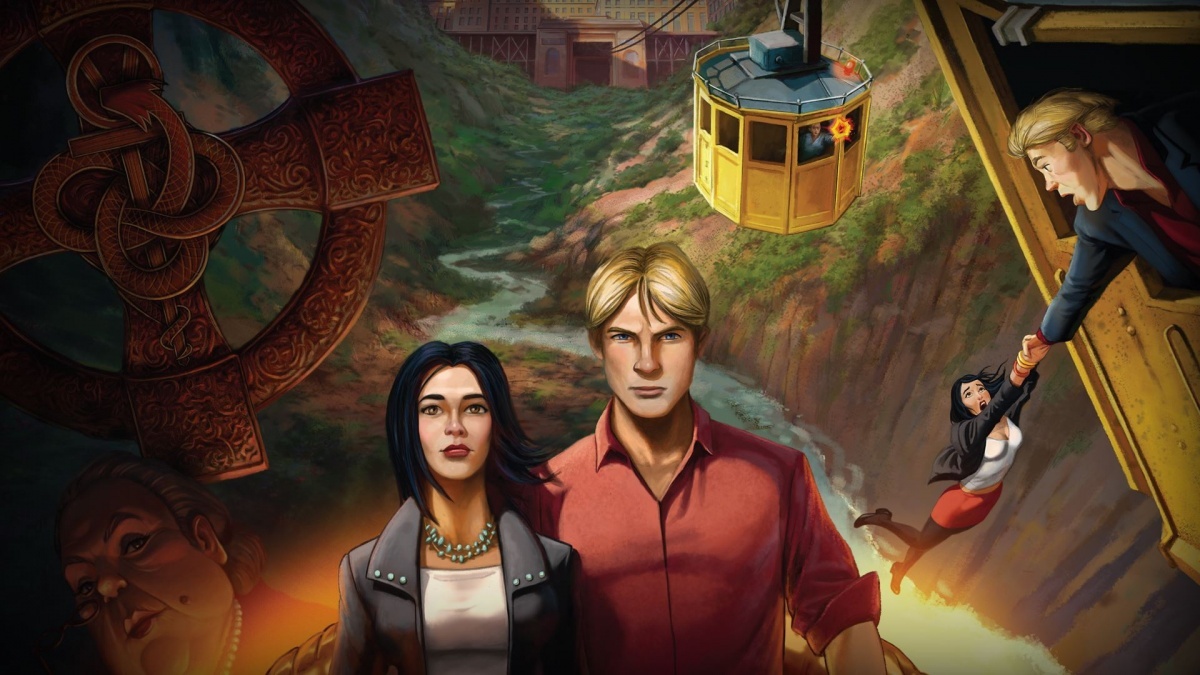
One of the mistakes that we made was that we promised the game would be DRM free, which is fine, and we worked with Koch Media who were absolutely fantastic and it produced our Kickstarter rewards and sent them out and also published Broken Sword 5 at retail. For us, and for it, it was a great partnership, but we reached the point where it phoned up and said "Look, we've got the retail version, which requires a Steam key. If you want to ensure that the Kickstarter versions go out at the same time, or earlier, you have to give us the master now or we can use the Steam master."
I remember the phone conversation, and I knew I was between a rock and a hard place, and I said let's go with the Steam version, and I kind of knew there would be some problems. What happened when the game came out was that a small proportion of people went absolutely ballistic because we promised a DRM free version and this was Steam. It was quite clear that what we promised was different to what we actually delivered. So, I got together with the team - and this was a classic case of 'don't reply straight away, don't reply until you're absolutely clear on what your position is' and it was quite clear that actually these people had every justification for objecting, so what we decided to do was to print some DRM free discs and offer anybody who wanted one a DRM free disc and the wonderful thing is if you address these things pretty quickly, and as long as you cancel them out, then you can turn the people who are the most negative into people who are incredibly positive because you are responding directly to their concerns, so while we had to be careful on what we promised, once we did promise then we were able to ensure that we delivered on it and I'm quite proud of that.
Our Kickstarter wrap video has some interviews with about seven or eight people, admittedly they were the seven or eight people who responded to our questionnaire so they were likely to be people who were happy, but it's humbling that our campaign and our games mean so much to those people. One of the extraordinary things about dealing directly with our audience is that we get to hear back from them on their memories and what the games meant to them and we receive the most extraordinary communications.
Just a month or so ago I was with a young man who came to hear me speak at PC Gamer Weekender and he talked about the fact he played Broken Sword with his father, his father died two years ago, and how much it meant to him. Likewise, a young man wrote to us and said that the Kickstarter campaign reminded him of his relationship with his grandmother because they used to play the game together. She took him into a games shop when he was very young and they bought Broken Sword and they played the game together and he'd run home from school. Stefano [Petrullo - owner of Renaissance PR], the first thing he did with his fiancée when they first met was play Broken Sword together, so I'm very proud for the medium, and indeed the games that we've written as a team, because clearly to a lot of people they mean an awful lot and there's very little better than being able to say that.
C3: With the Serpent's Curse you kind of ventured into episodic release. Do you think the episodic nature of adventure games is going to be the new norm?
CC: We didn't intend to do it episodically at all. What happened was that we released the Kickstarter in August 2012. We promised delivery in April 2013, which would have been fine as it was intended to be a smaller game. But then the Stretch Goals meant that we added new locations and we added new characters and we sat down and we thought, "So much had changed, this is a great opportunity to actually review everything." So, the New Year came and April was approaching and it was quite clear that we were way, way, way off finishing, so I sent an email round with an update and thought quite hard about it because I was really worried we were going to alienate our backers, and we wrote this over the weekend and I was bracing myself for a response and there was quite a response, and the response fell into two categories: one lot said we never believed you in the first place, so that's fine, and the other lot said we've been waiting five years we really don't mind waiting another six months, which was just wonderful and kind of showed just how generous [people can be], because ultimately when people back a project it becomes their project so as long as you're honest, as long as you're open with people, then your problems become their problems, your setbacks are their setbacks - they're part of the development process, albeit on a slightly arms-length basis.
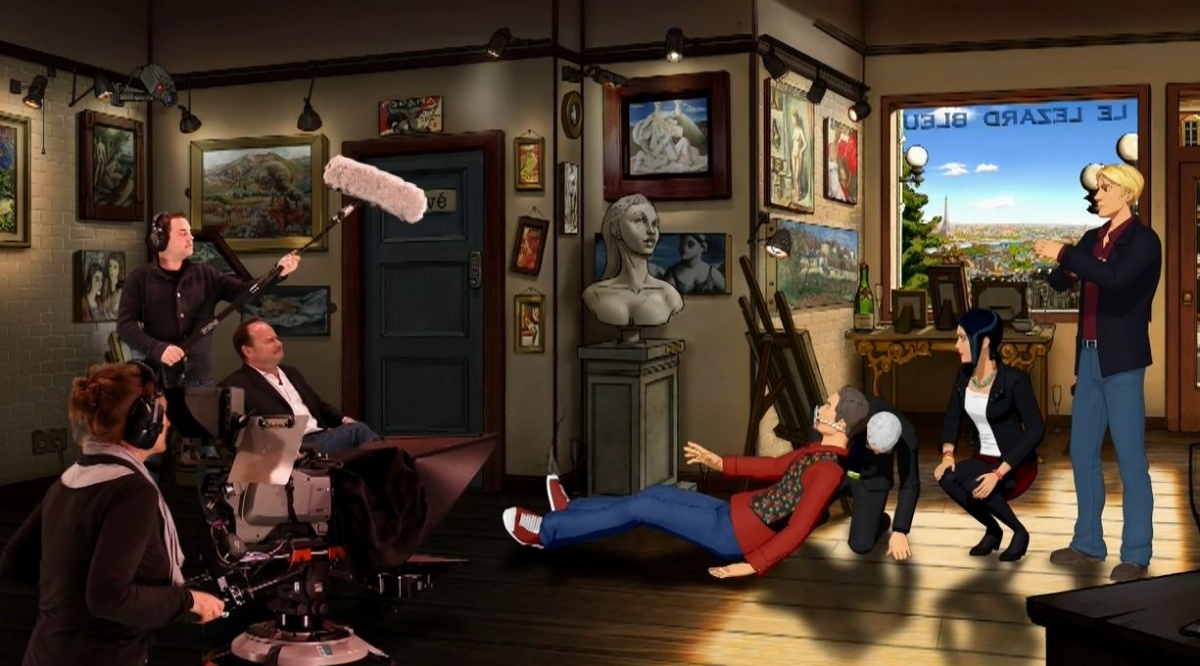
Then two things happened towards the end of 2013. Firstly, Tim Schaffer announced that even though he had $3.3m that wasn't enough and put out a fairly clumsy release, I think, I mean basically it was pretty clumsy and said, "Well we'll be prepared to fund some of it ourselves," which I looked at and thought was extraordinary because from our perspective we absolutely fully expected to fund the vast majority ourselves. And then Niall Stevenson cancelled a game called Clank and I don't remember how much that had raised, but he blamed the market, he blamed the fact that he hadn't got enough money, he blamed everybody apart from himself and I could see this storm brewing. I think that [Red] Goddess was beginning to run into trouble or maybe there was anticipation that it would but I could see this storm brewing and we reached towards the end of September 2013 and it became clear that we wouldn't be able to finish the whole game and I was absolutely terrified at the idea of going back to our community, particularly when there was so much negativity and there was so much doubt about Kickstarter as a whole, and telling them that actually despite the fact that we promised them April and then the end of the year that it wasn't going to happen so we made a decision pretty late on to split the game so that we could launch before the end of the year and that was the main motivating factor. It was a clunky split, the game was never designed to be split at that point, but we did so and I think it was the right decision all things considered but it was absolutely far from ideal.
C3: You wouldn't look to make an episodic adventure?
CC: Well, I really admire Telltale. The thing about Telltale, of course, is that it does use licenses and it uses comic books so its model is quite different to ours and the type of games that it writes are much more like interactive narrative or interactive fiction than adventure games, per se. That's not in any way to criticise the team - it's fantastic. My previous answer was explaining why Broken Sword 5 was split, and that it wasn't ideal. Actually writing games episodically, I think, is quite exciting as a concept. I think we would probably still go for single installs in the type of games that we write. Clearly, episodic works extremely well for Telltale; I'm not quite sure it would work quite so well for the games that we write.
C3: With The Serpent's Curse you made the decision to switch from 3D graphics - as seen in The Sleeping Dragon and Angel of Death - to more traditional 2D graphics. What was the thought process behind this?
CC: As you'll know, a lot of our hardest core, hardcore fans are huge fans of 2D over 3D and one of the huge advantages of 2D, of course, is what you see is what you get; you can draw things and you can know exactly what it's going to look like whereas when you go to 3D, unless you have really talented artists, nothing ever looks anything like you expect it to! The other thing about 3D is that visually it's not as clear as the cartoony look. It's drawn specifically so that as you examine the background, it's clearer to the viewer and it's easier to make it clearer. You can also change the perspective, as long as you do it skilfully, to create mood and to create atmosphere, which is a lot harder in 3D.
One of the things about our Kickstarter is that we said it was a 2D game so it had to be a 2D game and that's one of the strengths, and to an extent one of the weaknesses to Kickstarter, that once you've said something you really do have to deliver that but absolutely no regrets. We worked with some very talented artists. Our lead background artist, Troy Davis, was very experienced and came from a cartoon background. It like we were going back to basics. That's what we promised, and that's what we delivered.
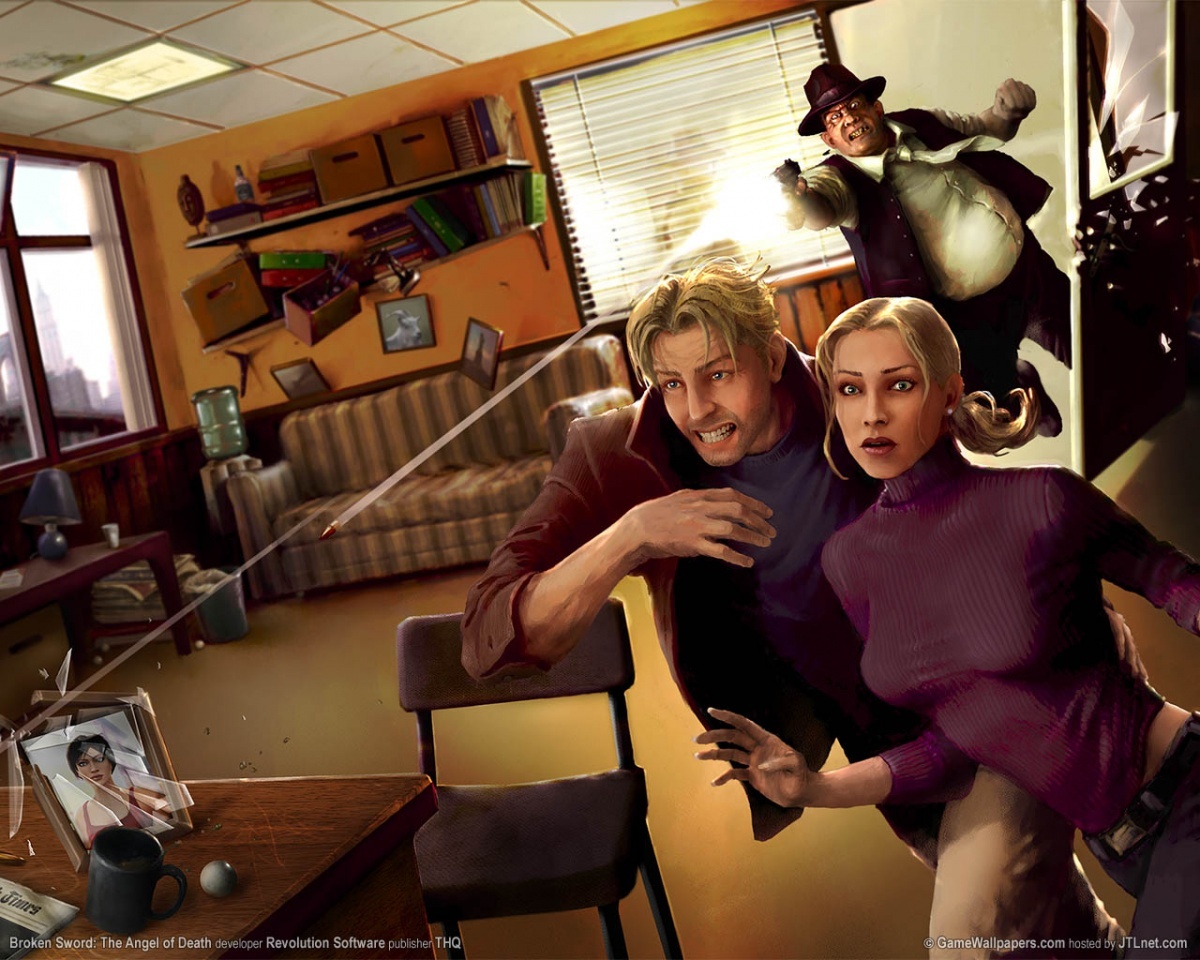
C3: I was playing through the first Broken Sword recently and I was still amazed at the sense of scale you get from 2D that I've just not seen from 3D games.
CC: What an interesting comment!
C3: Because with the background and the foreground moving sort of independently, you've got that sense of distance and movement that I thought was really fantastic.
CC: Well! The beginning of Broken Sword 5 has quite an impressive parallax because we've got five layers: the table, the gallery itself, outside the window and I think we've got two more. We really pushed the boat out, particularly in those early scenes, in terms of huge numbers of parallaxes to try and create that sense of depth.
C3: In your opinion, what is it that makes a compelling adventure game?
CC: To answer it slightly differently, what an adventure does is interweaves the narrative and the gameplay in a unique way for the genre. In other words, instead of the story being a bolt-on to the core gameplay, with an adventure the core gameplay is the advance in the story, which is one of the reasons why they are actually very difficult to write and why they're expensive to write because obviously as the story changes, so the gameplay changes. In pretty much every other genre you have a repeated gameplay mechanic that allows the story to move forward independently of that gameplay mechanic. Now, clearly, the gameplay mechanic and the story are going to be similar so that it feels like a unified experience but in an adventure the story and the gameplay are pretty much one and the same in many instances, so clearly getting that right is absolutely at the core of writing a good adventure.
One of the things that is very interesting is that if you look at the way that interactive narrative works it's different to linear narrative; for example, to create an empathetic character in a film, television, or a book, you have a certain amount of time, particularly in a film. You go into the theatre and you have maybe 15, 20, 25 minutes at the most, and if after that time you haven't created an empathetic relationship then the audience gets bored and might leave, but they have plenty of time. In a videogame, because you are requiring the player to work right from the very beginning, you need to create an empathetic bond so that you motivate the player to play the game in an active rather than a passive way. So you need to create empathetic characters really, really quickly and one way of doing, of course, it is to use licences. So, if you have Harry Potter, then you know exactly who Harry Potter is and who Hermoine is and you know what their objectives are and you have an empathetic bond. I think one of the advantages of 2D is that because of the grammar of cartoons, you can actually probably create an empathetic bond quicker than you could do in 3D, I suspect, because we are able to caricature the characters more than you would do in 3D - 3D is much more literal, of course.
So, to answer your question:
1.) You have to create empathetic characters quickly;
2.) You have to bind them into the story so that their motivations and the player's motivations are absolutely unified;
3.) And you have to be aware that it's not a linear story, it's an interactive story, and as such it needs to be handled quite differently.
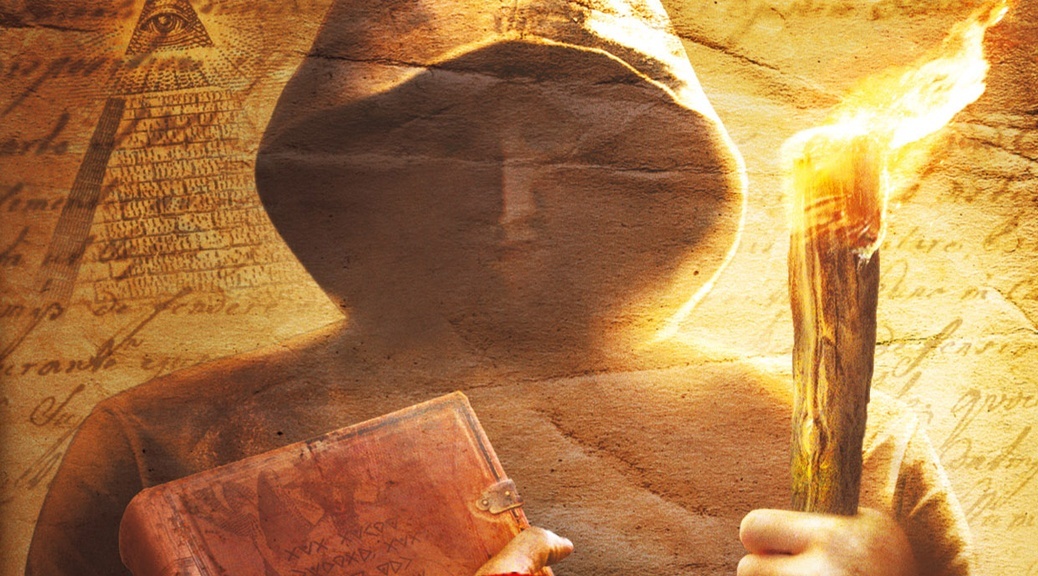
C3: You've clearly got a love of history, with most of the Broken Sword games paying quite close attention to the Knight's Templar. What was it that attracted you to this period of history and, as a follow-up question, what period of history would you love to base a game around?
CC: The first Broken Sword came about when my wife and I were having dinner with a friend who was at that time Deputy Managing Director at Mirrorsoft, which was Robert Maxwell's outfit, and we were talking about a new game and he'd just read Foucault's Pendulum, which involves a conspiracy in the modern day involving the Knights Templar and it was just such a wonderful premise. I went on the read The Holy Blood and The Holy Grail - most of which is utter nonsense - which, of course, is what Dan Brown used for The Da Vinci Code, and indeed was sued by the writers because he took it absolutely literally. It is utter nonsense and Dan Brown was fooled into believing it. Indeed, I imagine the researchers were fooled into believing it, as well.
It is a very, very rich vein that whole medieval period and the Knights Templar, in particular, because they were warriors on one front, they were monks another, so you have this dichotomy, this contradiction, that is really exciting and really interesting. And then you have the huge wealth, you have the betrayal by the King of France, Phillip IV, and the Pope. You have the secret of whatever they discovered when they excavated under the temple mount in Jerusalem. Whatever happened to their fleet, they had a huge fleet in La Rochelle when the King's deputies swept down on them in 1307. All of these extraordinary loose ends that were left 700 years ago, which can be considered to potentially resonate into the modern day and that was why they made such a great background because what Broken Sword is about generally is ancient mysteries that resonate into the modern day and threaten our heroes - George and Nico - today. The stories and the puzzles we build juxtapose the history from 700-800 years ago with the modern day, so that worked particularly well.
A lot of our fans are convinced that Dan Brown must have played Broken Sword because there are so many similarities between Broken Sword and The Da Vinci Code. Of course, we came a good five or six years before him. I would never make that claim of plagiarism directly but I'm very happy for others to do it on our behalf. I still love that whole period, and Broken Sword 5 was attempting to capture some of the magic about the Gnostics and the Cathars of the Languedoc. There's a village in the Pyrenees called Montségur, which actually is mentioned in Broken Sword 5, where the Cathars had their last stand in 1244, and the drama of that particular siege, the Spanish inquisition, which was formed just after that point in a major part to hunt down and destroy any remnants of the Cathars, investigated and interrogated a group of villagers in a village called Montrieux and those villagers talked about something of great value being smuggled away from the castle down a sheer cliff before they finally surrendered and that's what led to the grail mythology.
So a lot of people would say that this wonderful, wonderful village and this wonderful castle is actually the Grail Castle. So all of these things still resonate today, and I think that also, going back to Biblical times, people have a very mixed view on religion now. A lot of people would claim to be spiritual but a relatively small number of those people would claim to be religious and a smaller number still would believe that God was a man with a white beard sitting in the clouds. So you have a very wide range and we have the opportunity to, through any media, but especially for me through videogames, of attempting to explore some of these ideas.
The problem with the Knights Templar is that after The Da Vinci Code they became incredibly cliché because so many films and so many books came out about them but we were there first. We were inspired by Umberto Eco and Foucault's Pendulum, but Broken Sword is quite different, but in many ways we created that zeitgeist that so many others then followed so successfully 10 years later.
C3: If there was a particular period of history that you haven't explored yet, what would that look like?
CC: What a good question! It's kind of hard to let go of the whole medieval period because it's so extraordinary. I mean, the obvious one would be the Tudors in England because… you watch something like Game of Thrones, and Game of Thrones utterly captures that Tudor period, and the extraordinary goings on at that point. The only problem is that the Tudors are obviously very English and so are probably of less interest abroad, whereas the medieval period, because it ignited the whole of Europe at that particular time, we have a big European and, therefore, American potential interest. So, to answer your question directly, I guess the Tudors is very rich. Whether you would use the Tudors directly or whether you would do something closer to Game of Thrones and actually just take their stories and develop them into a fantasy world, I have no idea.
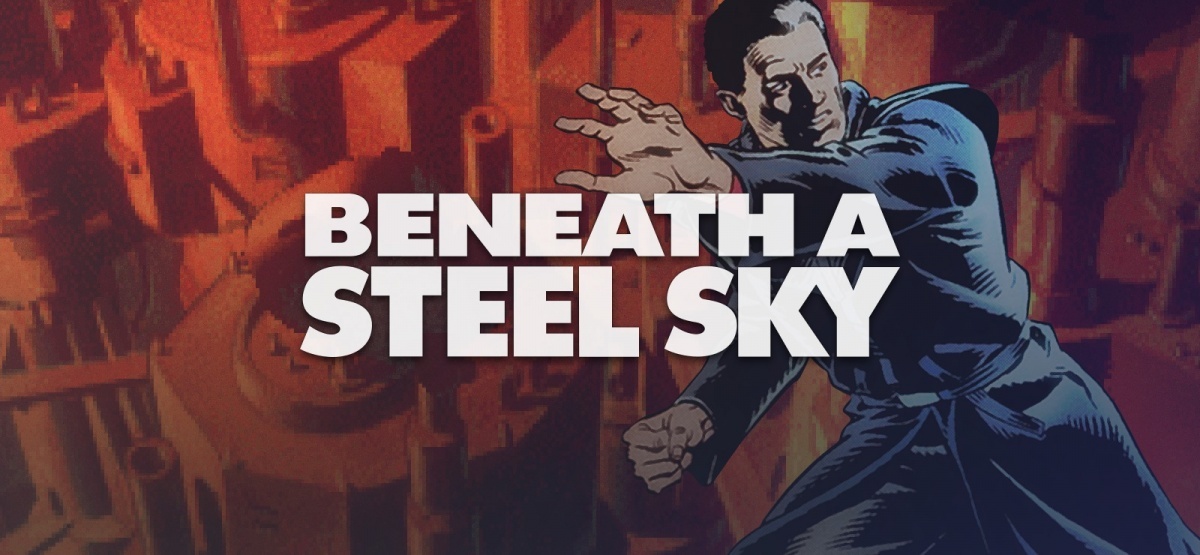
C3: Revolution Software is celebrating a very special anniversary at the moment. What can we expect in the near future? I know a lot of people are looking forward to potentially a new Beneath a Steel Sky...
CC: Well, Dave Gibbons is wonderful and the funny thing is when we made the 25th Anniversary I got in a car with a very talented filmmaker, Chris Brooke and his colleague, and we drove to see Dave, which was great, we drove to see Sean Brennan and interview him about his memories, we drove to see Barrington Pheloung, and I hadn't seen Dave Gibbons for quite some time. He moved to his new house some years ago and I hadn't actually gone to visit him there, so it was a fantastic opportunity to actually catch up and I said to him, "We ought to do something together" and he said, "We absolutely should," and we agreed this time we wouldn't just talk about it, we'd actually move it forward, so we're talking very seriously to Dave about a new project.
Also, we're prototyping a totally different project that may or may not come off, and while we're not working on a new Broken Sword in any form, I've got some ideas that I think would work really well, so we've kind of got three things on the table at the moment potentially. But we run a studio system whereby I'll rent an office when we go to production and then we disperse and work from home offices as a small core team and then we come back together again, so what that means is that we're not under any immediate pressure; we don't have high overheads and we will move forward when the time is right. We're working very hard on a number of prototypes and, in all honesty, I can't say any more than that. It would be naïve to talk too much about anything until we're clear on the approach we want to take but we really are still exploring.
C3: The versions of Broken Sword on the Wii and DS were really warmly welcomed by Nintendo fans. Are Nintendo fans going to be happy with any of the new games under development or any re-releases?
CC: Well, a lot of those Nintendo fans went on to mobile and one of the reasons that the Director's Cut of Broken Sword 1 and the re-mastered version of Broken Sword 2 I think did so well was because so many of those Nintendo DS fans moved on to mobile when the iPhone came out and we found that the size of the audience and the loyalty of the audience really surprised us and I can only assume that was because they came from Nintendo and I think Nintendo's now reverted to the more hardcore Mario type fans so I'm not sure Nintendo is as appropriate now as it was back in 2007/2008 when we released the game on DS and Wii.
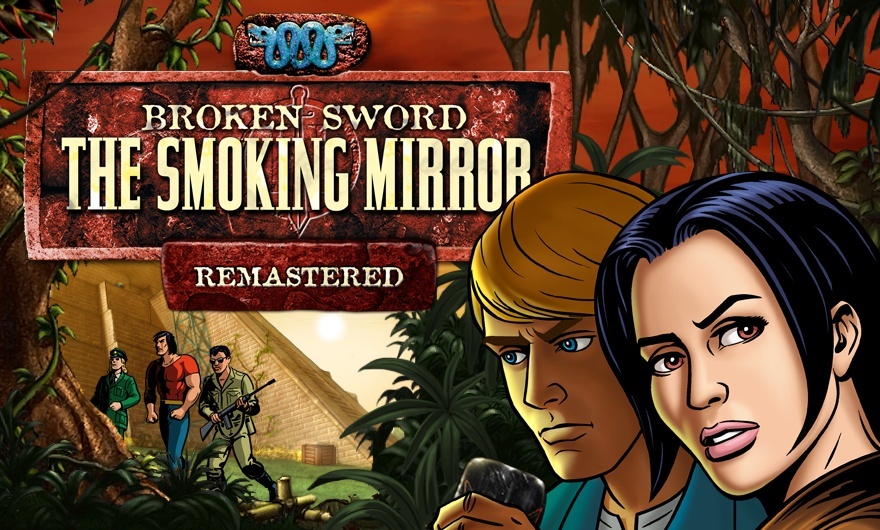
C3: Do you think that mobile gaming and the revolution that has caused has helped or hindered adventure gaming?
CC: Oh it's helped, absolutely, because the wonderful thing is that adventures, as long as the interface is relatively straightforward to pick up relatively quickly, the adventure is ideal for a, and I hate the term casual, but let's call it a casual audience and a lot the mobile is a casual market. Now, clearly, the vast majority of people will play free-to-play games. I mean 90+% on mobile. And according to a chart that Flurry did a year or two ago, I think it's 90% are free-to-play, then 7% are $0.99. So you've got 3% for everything else. We're selling the game at $5 plus $5 - $10. So at $10, the little slither of the overall market that we address is absolutely miniscule but because the market is so big even a tiny slither is actually very, very healthy, so we're thrilled and we're delighted with the revenues we get from mobile and they're very, very important to us, but we exist in a tiny area of the market way, way, way outside the free-to-play and, to an extent, outside the 99 cents, as well.
C3: Finally, what are your thoughts on the current Virtual Reality hype? Is it a hot trend or short term gimmick? Could you picture using VR in one of your adventures?
CC: Oh, yes! I'll be quite honest, and this might be slightly contentious: I find it very hard to believe the PC tethered VR. Because, games are so social now and the adventure games that we play people talk all the time about playing them with their friends and their girlfriends and their family and their brothers and sisters and their grannies and that's at one end. At the absolute other end is the VR headsets. I utterly believe mobile VR, particularly Keep Talking Nobody Explodes, which is a wonderful example of how you can have a party game in a VR environment. That kind of works well - two or three people sitting around, they've had a couple of drinks, they've all got their Gear VRs, they stick them on, they play a social game… that I absolutely believe and I think that is what's going to drive the market. I kind of believe Morpheus, or what used to be called Morpheus, I think it's now called PlayStation VR, because it's so specific to the console but I think Oculus is going to find it very, very hard, and even the wonderful HTC and the wonderful Steam VR system are technically absolutely magnificent but I think are quite a hard sell. I am excited by Microsoft and HoloLens because, not least from productivity but also games, the fact that you're quite clearly seeing directly into the real world I think adds quite a lot to the experience. So many people are excited by VR and think it's going to be absolutely the next big thing and they're probably right and I'm probably wrong but I'm certainly a lot more sceptical than many.
C3: Thanks very much for your time!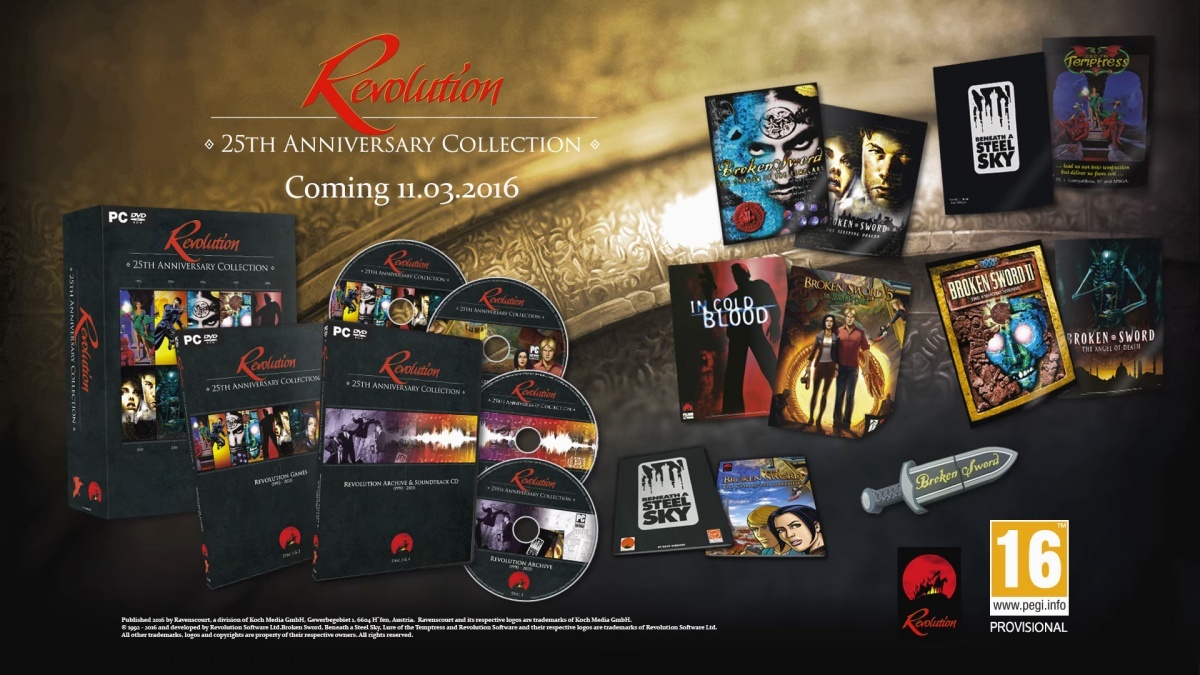

 Sign In
Sign In 15.05.2016
15.05.2016  jesusraz
jesusraz 
 Link to this post:
Link to this post:  Subscribe to this topic
Subscribe to this topic Features
Features





 Top
Top

